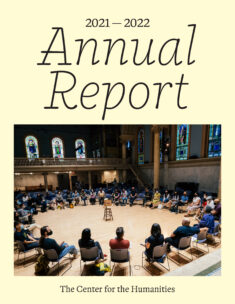About the exhibition
The Racial Imaginary Institute Project includes local and international partnerships in a variety of forms.
During the academic year 2021-2022 The James Gallery gathered a seminar of Graduate Center PhD students in multiple disciplines with The Racial Imaginary Institute members and scholarly and artistic fellow travelers.
Seminar Reflections
As researchers of the lived experiences of other individuals and cultures, who are always inescapably examining these lives through the filter of our own lived and inherited experiences and fluctuating states of being, we aspire to illuminate the underlying assumptions and messiness of “we” as both an object of analysis and a subjective position.
We are a still emerging collective contemplating the bedrock of communal being and what it means, looks and feels like to be alive as psychosocial, political, linguistic, creative, technological animals who are born into and depend on being members of various group dynamics.
Living through the “resurgent” mobilizations of a totalizing, violent and xenohphobic nationalist “we,” some of us attend more to the exciting possibilities of counter-collectives and political movements, others point more to the fraught terrain of a more anxious, uncertain “we,” and perhaps many of us oscillate between both.
We are existentially, affectively, ideologically, and sensually concerned with: who are “we” and who are “they”? What is the critical material and affective labor invested in and required to make and continually remake ‘we’ formations? What are the multiple, overlapping – and sometimes contradictory –“we(s)” that each of us feel a part of?
How and where is it possible, and not possible, to discern the fine, shifting and volatile line between “us” and “them” – between what is “ours” and what is not?
Through our seminar sessions we have accumulated questions and vantage points: What are the dangers and benefits of expanding the notion and practice of “we”? Can a “we” formation ever stand outside of a liberal, nationalist logic? Or is “we” an unsalvageable, romanticized construct that needs to be abandoned? How and to what extent might the idea of “we” complicate nation-state formation? And is it really possible to define an “us” that is more than just “not them”, that is more than an inherently exclusive category? Might it be useful to approach “we” as a place, a moment of affinity? Might it be productive to approach “we” as a “unhomely home” that operates across a range of more public and more intimate scales, of which nationalism is but one manifestation? As the chorus of voices in a Karrabing Collective film says, “forward to the bush, but where we gonna to?” What are the implications of what it means to construct belonging on alienation, loss, exclusion, uncanniness? How does the urgent need for, and messy translation into practice of, a cohesive, radical “we” – imaginative, but not a dream – mobilize existing exclusions and hierarchies (alienations, and loss)? Through this urgency, what is not taken into account in practice (e.g. questions of property, gender, composition of the family)? What are the practical and intellectual consequences of these explicit and implicit omissions?
Seminar Participants:
Claire Cahen
Denisse Andrade
Deborah Philip
Emine Busra Unluonen
Friederike Margarethe Windel
Hilarie Ashton
James Sevitt
Jin Wang
Josh Adler
Jonathan Liebembuk
Katherine Carl
Mia Curran
Michele Chinitz
Michelle Phương Ting
Natalie Willens
Simon Wu
Stephanie Cruz
Whitney Evanson
Organized by James Sevitt, Emine Busra Unluonen, Katherine Carl
